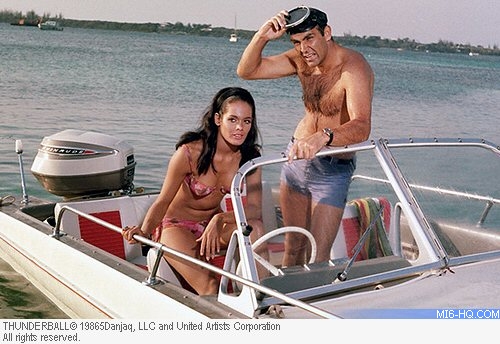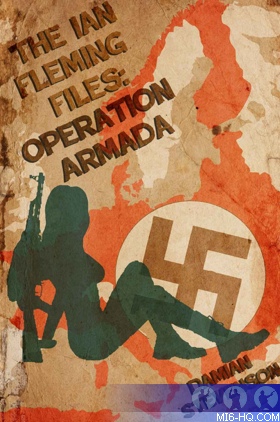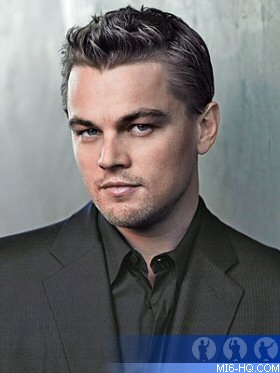Do you remember when you first read Ian Fleming, what was it that captured your imagination?
Before I started reading the first Bond book I was captivated by Ian Fleming's biography on the inside flap of the paperback. The idea of an Englishman leaving the rat race and living in the Caribbean and writing the world's most famous spy novels. I remember thinking, "Wait, you can do that? You don't have to get a job in rainy London but you can live somewhere sunny and be a writer?" I'm not saying it's the reason I left England to be a writer in California but maybe it did have a subconscious effect!
Are you a fan of the Bond films? What is it that transfers best from the page to the screen for you?
The snob in me thinks that the best Bond films were made in the first half of the 1960s - "Dr. No", "From Russia With Love", "Goldfinger", and "Thunderball" with the beginning of the end coming with "You Only Live Twice" in 1967, not when Sean Connery left the series but when the budget and special effects started to take over from the story and characters. Along the way there are some fun ones like "On Her Majesty's Secret Service", "Live and Let Die", "The Man With The Golden Gun", "The Spy Who Loved Me", "Moonraker", and recently "Skyfall" was great - completely reinvented the franchise. Each new one is always an event. So they may not all be as good as "Goldfinger" but they are always entertaining and exciting.

Above: Bond races to the Bahamas to stop a nuclear attack.
|
The main difference between the books and the films is probably a matter of tone. The books are more serious, the movies are lighter. But they are also quite similar. Ian Fleming invented product placement - mentioning the Ronson lighter, Dunhill cigarette case, Smith and Wesson, etc. - and wrote movie-like stories. His books anticipated modern Hollywood, the idea of the action franchise. "Thunderball" was really the first big budget action movie and was a monster hit. If you measure movies by attendance, it's still in the top 10 or 20 of all time. His books were action movies - St. George slaying the dragon and winning the princess - and the difference between the books and the movies is pretty much a matter of form, of book versus film. In the movies, everything that makes Ian Fleming's writing unique is gone save for the ideas behind the writing - the characters and what happens to them. Moviegoers don't get to read the brilliant descriptions or the nuances of Bond's psychological condition, what he's thinking or feeling, what it was like to be a secret agent anonymously still fighting the war after the war was over, which Fleming captured so brilliantly. They just get to see, so it's a more superficial encounter with Bond. You're seeing Bond through the eyes of the directors - usually journeymen, uninteresting film-makers for the most part with the exception of the early Bond movies and "Skyfall" - so you are comparing Lewis Gilbert to Ian Fleming or Guy Hamilton to Ian Fleming. It's apples and oranges, as they say.
How did the idea for the book, "The Ian Fleming Files: Operation Armada", come about?
Years after selling a screenplay that featured Ian Fleming as the main character in an invented story, I decided it was time to tell a more reality-based version of events. After seeing "Skyfall", and the massive global impact it had, I realised it was time to write a book about the man who created the most enduring fictional character in the last hundred years.
Can you tell us how you tempered the fictional elements of the novel with the fact you were working with such an iconic, real life hero as your central character? Similarly, how did you approach featuring Admiral Darlan and General Bock in the book? Was it a challenge to take these major military figures of the period and adapt them into the novel's villains?
It was actually easier to take real life people and develop them into characters rather than having to invent them from scratch. I happen to love research so I enjoyed learning what medals General Bock wore, the type of brandy Darlan liked, etc. Sometimes I had to stretch the truth a little but this is historical fiction, not a documentary. Darlan died a little later than he does in the timeline of my book and that was the one big historical liberty I took. As for turning Darlan and Bock into villains, that was easy. One was a Nazi and the other a French collaborator! |
|

 Order Now (Amazon USA) Order Now (Amazon USA)
|
Where did you derive inspiration for the character of Denise Astier? One of her aliases is revealed to be 'Violette Szabo' - was this notorious World War Two spy an influence?
Yes on Violette. I probably should have changed 'Szabo' but I liked the sound of it so much. Denise is an invented character but based on personages of the era. Her background, dress, weapons are historically accurate. The main inspiration came from reading about the French Resistance, how so many of them were ordinary people who became soldiers overnight.
The book is full of impressive period detail, from weaponry to vehicles and tailoring of the time to geographical description; was research important before you started writing and how did you go about it?
Thanks. I use research to help me build the foundation of the story. If there's certain facts that I am obligated to include in chapter one, say, like setting, year, what the character would be wearing, what car he would drive and so on, then I already have some ideas for the chapter. Dressing a character, describing his car, sparks the imagination. Clothes and cars are easy and from there you can move to the harder stuff like what is the character thinking, what is the purpose of this scene, etc. Also, I read about the period as I write so I go back and add items a lot. For example, I read that the French Resistance wore an armband with the cross of Lorraine so I thought it would be cool to give one character a patch with that logo. However, with all this said, I still managed to make several historical errors! A reader pointed out that the Police Positive revolver did not have a safety catch on its 1940 model, for example. I also mention plastic perhaps more than I should for 1940. I actually researched plastic but evidently not enough. I came from Hollywood where the people who read your scripts are studio executives, agents and producers. When you write a novel, you are read by professors and historians and world war two veterans. Fortunately, I was able to revise the book and fix these oversights. Now, with the second book, I am doing two things. One, I am restraining myself and showcasing less period detail (I think there is too much description of hardware and fashion in 'Armada') which should mean less errors. Two, I am being much more thorough than I was before!
What is it about wartime novels that is so timeless? How do you communicate the fear, risk and danger to a younger audience who have not experienced anything like it since?
I read recently that World War II is still fascinating because it was the last conflict that involved everyone, the whole world, and that even if you didn't know the details of what happened just the idea of the entire planet being united in conflict against a common enemy is inherently compelling. Then you have the people who do know the details, feel some connection to the conflict, lost relatives in air raids, fought Nazis, and that collective memory fuels what is a global fascination in the six year conflict. As for war in general, in terms of story everything is heightened. They might die tomorrow. There's no food. You might get captured. A bomb could fall on your head. That person might be a double agent. And so on… Things happen during war that don't occur in normal life. So in war stories it's believable that so much can be happening all the time and of course that makes for a juicy read.
The title of the book "The Ian Fleming Files: Operation Armada" - and the way it reads - suggests you intend it as the first in a series of novels about Fleming in the war. Can we look forward to any more? If so, any clues on further Second World War events/ missions you're interested in featuring in further books?
The next book is called "The Ian Fleming Files: Operation Parsifal" and is almost finished. It's set near the end of the war, in January 1945, and involves Fleming infiltrating a secret German society dedicated to assassinating Hitler and replacing him with Rommel. Fleming has to save Hitler's life so the war can proceed in the Allies' favour. I jumped forward in time because I don't want the books to be repetitive. I want to open them up beyond the arena of World War 2 by placing Fleming on more exotic missions in the post war years. The third book will thus be a non war story and focus on his life as double-agent, with his cover being a journalist while he continues his work at the NID.
Could you tell us how you got involved in the treatment for the Fleming biopic?
Sure. I wrote a script about Fleming in a story similar in style to "From Russia With Love" and my literary agent sent it to Warner Bros. They purchased the script.

|
|
What challenges do you face dramatising Fleming's life on the screen, and how does that process compare to fictionalising the author for the novel?
In the movie, there's less room for nuance. They want three big scenes, a character that can attract a star and lots of opportunities for special effects/CGI.
Can you tell us something of the current status of production?
As far as I know, they are waiting for Leonardo DiCaprio who is supposedly taking a hiatus.
If you could have your dream cast, who would be involved in the project? Specifically, who do you envisage playing Ian Fleming?
I like the idea of Leo. Also, Jude Law and Clive Owen would be interesting. It's not easy, a bit like casting Bond. You want someone smooth and debonair but who also looks convincing holding a Walther PPK.
Left: Leonardo DiCaprio is set to produce a script by Damian Stevenson. |
Many thanks to Damian Stevenson, and Adam Bollard.